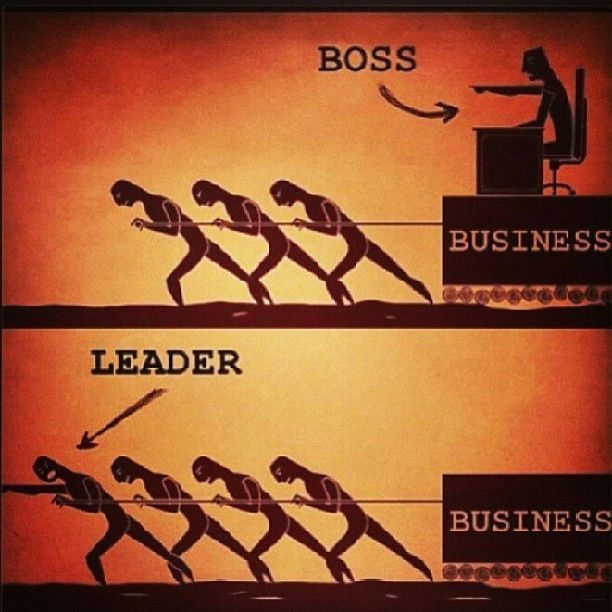In every single possible field of work, a boss or team leader can be the source of some of the best bits of resonating encouragement you’re likely to come across. Whether it be a good pick me up in a time of need, or the foundation stone at the start of a successful career, the influence a boss can have on us really cannot be overstated.
We spoke to several leading individuals right across the board for their takes on what makes some of the best pieces of advice they’ve heard from their bosses over the years.
Navigate the article
#1 Cream Rises To The Top
I spent summers in high school and college working at Noah's Ark Waterpark in Wisconsin Dells, Wisconsin. One of the park's owners, Turk Waterman, was someone I really looked up to and who taught me a lot about customer service, business, and being a good person. One rainy day we were having a conversation about my career.
Even 20 years later, I can still hear his words: "Cream rises to the top, Aimer." His encouragement has come back to me many times when I've had setbacks in my career or life, and I remember that, no matter how big the challenge, if you keep working hard, it will eventually pay off and you will eventually rise to the top.
Contributor: Amy M. Gardner, Certified Professional Coach with Apochromatik at apochromatik.com
#2 Care For Your Career
I had the privilege of working with Tina Tchen, then a dynamo litigation partner, and later an Assistant to President Obama, Executive Director of the White House Council on Women and Girls, and Chief of Staff to First Lady Michelle Obama. Tina was and is an incredible role model, and often told junior associates: "No one will ever care more about your career than you do." It was so important for us to hear that you can't wait for a fairy godmother to come along and give you career advice or smooth the path for you if you don't do your part.
Contributor: Amy M. Gardner, Certified Professional Coach with Apochromatik at apochromatik.com
#3 Fail Fast
Best advice from a boss: fail fast.
In business, it's extremely important to have the ability to pivot quickly is certain tactics or strategies aren't performing as expected. The fail fast mentality basically means toset fear of failure aside, and instead embrace it as a learning process. In many cases, fear of failure stifles innovation, and in some cases success.
Instead of fearing failure, welcome it, acknowledge it, learn from it, and move forward with a better understanding of what works and more importantly, what doesn't.
Contributor: Brandon Seymour from brandonseymour.com
#4 Every Job Is A Sales Job
I was dissatisfied/underutilized with my current position and wanted to take on a more challenging role within the organization. I asked my boss for feedback and tips on getting promoted quickly. This is what he told me.
"Every job is a sales job. If you want to be successful in your career, you need to learn how to sell people on your ideas first."
Contributor: Kay from happytohustle.com
#5 Aware Of The Rivals
I was interning for a couple companies when I was first getting into the SEO field. Even though they were blatantly exploiting my effort (along with many others) for their own gain whilst dangling the imaginary prospect of a full-time paid position in front of me, I did learn a lot. Particularly from a disgruntled content department head.
One day, while I was just finishing up an article, I was proudly explaining how much better it was than the current articles on the subject out there. He said “there’s 20 other people working on the same exact thing right now - you have to do better than them too”.
It’s a valuable perspective to take in this industry - it has helped me form some very healthy work habits.
Contributor: Joel Bennett from tokeet.com
#6 Be Paid For Doing What You Like
I recall when I was just starting out in my career as a credit counselor and I wasn't sure if I was on the right career path when my first boss told me “Find out what you like doing best and get someone to pay you for doing it.” This quote by Katherine Whitehorn really resonated with me and has stuck with me throughout me career.
Contributor: Steven Millstein from creditrepairexpert.org
#7 Sales Isn’t For Everyone
"Ken, you probably shouldn't be in sales at all", said Bob V. as he rushed me out the door, firing me. I despised him for that and for other reasons. But over time his words sunk in.
Although sales is a wonderful occupation for those who have the drive to connect customers with a company's products or services, it was not at all for me--regardless of all the training and self-study I underwent. Bob's cold words made me take inventory of myself and discover who I really am and want to do. And so I took a job in a Public Relations agency and learned the craft. Fifteen years and millions of dollars later, I am still telling the world other people's stories--not selling wares in which I do not believe.
Contributor: Ken Kilpatrick, President of Sylvia Marketing & Public Relations at sylviamarketing.com
#8 Green Eggs And Ham
In the early 2000’s I got a chance to intern with Jim McIngvale (commonly known as “Mattress Mack”) while I was going to Texas A&M. I overheard him mention once that the best sales book anyone could read was Green Eggs and Ham by Dr. Seuss. I questioned him privately about it and he reiterated his statement and told me every sales person should read it.
I thought he was crazy but I decided to give it a chance. Once you look at it from a sales perspective, It is! It is! one of the best sales books you can read. Sam-I-am never gave up no matter how many times he heard the word “no” and he eventually closed the deal.
Contributor: Thomas Mitchell from 903forcash.com
#9 Results Over Style
Many years ago as a young general manager, I worked for a division of a 'Fortune 100' company. At an informal get-together, one of my bosses (a Senior VP of Operations) recounted a short list of the principles that he utilized in managing his people. One of those principles stuck in my mind and became an important part of my personal leadership philosophy: "Results are more important than style."
In a competitive economic environment, losing motivated, creative employees likely puts an organization onto a path that leads to mediocrity. So while it wasn’t always possible to utilize every new idea, I regularly encouraged the creative thinkers who worked for me. And I firmly believe that they often gave my unit a solid competitive edge!
Contributor: Timothy G. Wiedman, D.B.A.
This post was created with our nice and easy submission form. Create your post!










